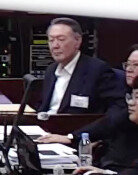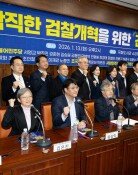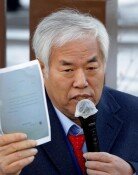Bank of Korea Raises Growth Forecast to 5.2 Pct.
Bank of Korea Raises Growth Forecast to 5.2 Pct.
Posted April. 13, 2010 13:07,
"Despite the significant increase in traffic volume from last year and rising oil prices, people are spending more money on gas. Even the president of Korea Expressway Corp. said, We need to discourage the use of gasoline by raising toll fees.
Strategy and Finance Minister Yoon Jeung-hyun told The Dong-A Ilbo March 12 that economic indicators in March were showing a clear difference from last year.
Recently released indicators showed a high growth rate, low inflation and increased employment, raising hope for economic recovery back to the level before the global financial crisis.
In contrast, however, small and medium-size businesses are not feeling confident because recovery on the surface has not yet trickled down to low-income households and smaller companies.
The Bank of Korea yesterday said economic growth in this years first quarter will reach 7.5 percent, up from the governments forecast of seven percent and the highest growth since 8.1 percent in the fourth quarter of 2002, when the credit card debt crisis occurred. This indicates the Korean economy is slowly rebounding from the shock of the financial crisis.
The faster-than-expected growth in the first quarter was because the two pillars of Koreas economic growth exports and domestic demand rapidly recovered simultaneously.
Product exports jumped from growth of 0.3 percent in last years fourth quarter to 21.4 percent in this years first quarter thanks to global economic recovery.
Capital expenditures, the driver of economic growth, jumped 28 percent in the first quarter as the IT sector recovered thanks to the smartphone buzz. Growth was a paltry 2.3 percent in last years fourth quarter. Private consumption rose 6.3 percent in the first quarter year-on-year.
Accordingly, the Bank of Korea raised its yearly economic growth prediction from 4.6 percent made in December last year to 5.2 percent, the highest level in four years. Most global forecasts predicted growth of 3.5 percent for Korea.
The economic growth rate rose more than expected because global economic recovery has been faster than expected. Compared to December last year, the global economy will show clearer signs of recovery and growth in global trade will start in developed economies, said Lee Sang-woo, head of research at the central bank.
The optimistic outlook, however, does not extend to low-income households and small and medium-size economies. The consumer survey index for March, a study conducted by the central bank of 2,159 households in 56 cities and released March 25, dropped to 110 for two consecutive months. This is the lowest level since 109 in July last year, when the financial crisis was in full swing, meaning more people believe the economy will worsen.
The Korea Chamber of Commerce and Industry released March 29 a survey on business perception of economic trends in which 512 manufacturers or 52 percent said the economy has recovered less than half of its level before the financial crisis.
The mismatch between economic indicators and the real economy as felt by the people stems from job insecurity. The central bank says that even if the job market recovers because of the improved economic indicators this year, getting back to the level before the financial crisis will be tough.
The bank forecast 240,000 new jobs this year, fewer than the 282,000 it predicted in 2007.
To help the improved economic indicators trickle down to the real economy, the private sector needs to stand on its own two feet with continuous growth.
Yoo Byeong-gyu, head of economic research at Hyundai Research Institute, said, To tackle the bipolarization of the economy, we need to foster industries that can create jobs over the mid-to-long term and resolve the mismatch of job supply and demand.
weappon@donga.com legman@donga.com




![[속보]국힘 윤리위, 한동훈 제명 결정…장동혁호 ‘뺄셈 정치’ 가나](https://dimg.donga.com/c/138/175/90/1/wps/NEWS/IMAGE/2026/01/14/133151701.1.jpg)


